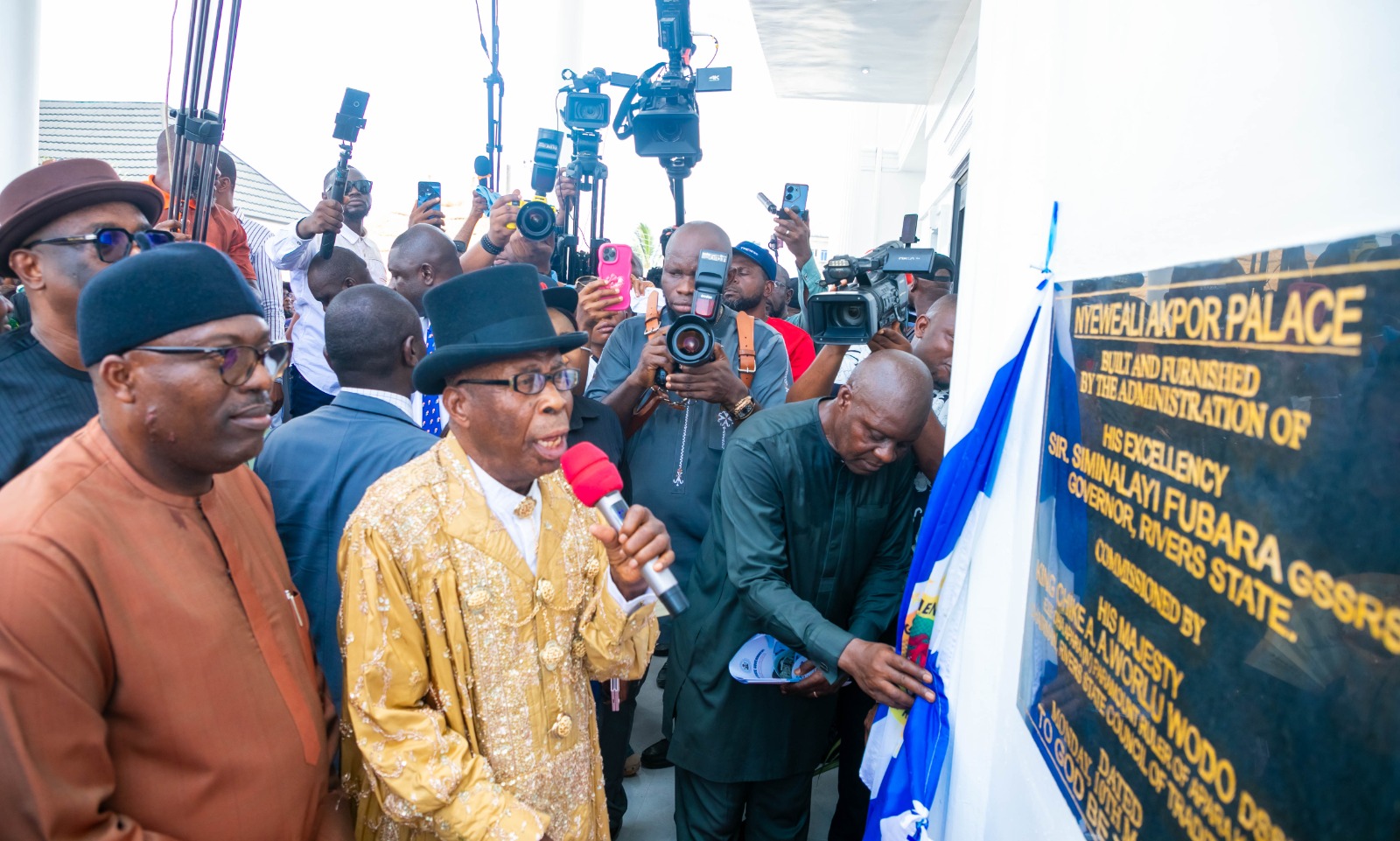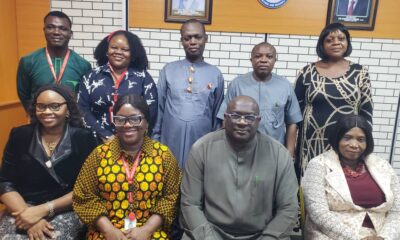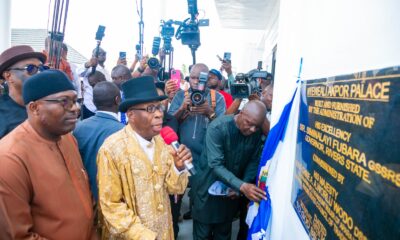News
Hardship: AfDB Plans $2.7bn Budget, Agric Loans For Nigeria …Approves $134m Fund For Emergency Food Production
The African Development Bank (AfDB) Board of Directors has approved $134million for Nigeria to implement an emergency food production plan, AfDB President Akinwumi Adesina has said.
According to him, talks are also ongoing for a $1.7billion economic and budget support loan as well as the launch of a $1bn agro-industrial processes in 28 states in Nigeria.
Adesina made the disclosures during an interview with journalists in Lagos on Monday.
The development came amid a biting food shortage that has led to hunger protests in Nigerian states and most recently attacks on grain warehouses in Abuja, Ogun, Niger and Kaduna states.
Last year’s fuel subsidy removal and exchange rate unification policy of the government have led to severe hardships with inflation now nearing 30 per cent amid a sharp depreciation of the naira.
Weak consumer purchasing power has affected businesses with the nation recording weak Gross Domestic Growth during the last quarter of the last year.
However, Adesina told journalists in Lagos that AfDB had pledged to support Nigeria through this period, disclosing that a number of agric initiatives should yield about five million metric tons of wheat, rice, cassava, maize this year for the country.
He exuded confidence that the development bank would work with Nigerian government to proffer solutions to the problems confronting Africa’s biggest economy.
He said, “I’m not used to complaining; I’m used to finding solutions. I did tell the President when I can last year that we would strongly support the Nigerian government in finding a solution to the challenges. As I speak to you today, we have approved $134m for Nigeria to implement an emergency food production plan. And that is not something that we are planning to do; it is what we are already doing.
“We have supported the cultivation of 118,000 hectares of wheat in Nigeria already this season. We will do 150, 000 hectares of maize production this march. By the rainy season, in May and June, we will support Nigeria to do 300,000 hectares of rice. We will also do 300,000 hectares of maize, 150,000 hectares of cassava and 50,000 hectares of soybean. So, that means that by the end of March, Nigeria would get out an additional one million metric tons of wheat; and by November, we will have an additional four million metric tons of rice, cassava, maize and soybeans.”
The AfDB chief, however, advised Nigeria to push for more food supply, pointing out that food inflation is a major component of the nation’s inflation figure.
Tackling inflation requires looking at some of the structural drivers, according to him.
“A big part of that (Nigeria’s) inflation is food price inflation. If you look at the Consumer Price Index, probably 65 per cent of it If not even 75 per cent of it now, is actually the price of food. And so, you don’t necessarily deal with food price inflation through your standard macroeconomic policy of tightening monetary supply. You deal with it by producing the food because that’s the thing that needs to be done. So I think it’s very important to be able to deal with that,” he said.
Adesina emphasised the need to enhance food production in the country.
On how the country could boost food production as quickly as possible, Adesina said, “But one thing that I would say is that the government needs to go back to the policy of electronic wallet system. Remember when I was minister, we did design a programme to get seeds and fertilizers to farmers directly via their mobile phones by electronic vouchers. We were able to reach 15 million farmers in four years; the whole place was booming with food. And I think that is what I will advise needs to be done and done very quickly. Because access to high performing yields, high performing seeds and fertilizers and farm inputs is very critical; otherwise you will not be able to do it.”
Nonetheless, the AfDB boss also pointed out the need for Nigeria to get low-interest concessionary financing to overcome its economic challenges.
He said issues around the exchange rate must be dealt with as an import dependent nation.
According to him, the AfDB is planning about $1.7bn economic and budget support loan for the country.
He said, “There needs to be a lot of support around Nigeria, given the tight fiscal space and the lack of forex, to make available a lot more concessional financing to the Nigerian economy. And that’s what we’re doing at African Development Bank. This year we expect to approve with our board because we always go to our board of directors for approval, but our plan is to be able to do $1.67bn of financing to Nigeria in different sectors, including considering a potential policy base operation of budget support to Nigeria. We are discussing with the Minister of Finance; that is part of a $1bn budget support operation that will go into two tranches. Again, I will say it has to be approved by the board, but these are all the things that we are hoping to be able to do.”
He spoke about other agric projects in the country.
Also, the AfDB is planning to launch this year a programme for a $1bn special agro-industrial processes are in 28 states, adding that “It this structural interventions that I will say would make agriculture more productive, efficient, and competitive.
“So those are the things that we are doing in Nigeria. In addition to that, we have a programme that we’ve already implemented, called Special Agro Industrial Processing zones. So these are new economic zones we are supporting Nigeria to develop. We provided $520m for that, ourselves, the African Development Bank, the Islamic Development Bank, and the International Fund for Agricultural, currently working now in eight states. We expect that those things will start hitting the ground and start construction by June of this year,” he added.
News
Fubara Urges Rivers People To Remain Peaceful, Law-abiding …As Eze Worlu-Wodo Inaugurates Palace For Akpor Kingdom

Rivers State Governor, Sir Siminalayi Fubara, has said that despite the ensuing political circumstances against his administration, Rivers people will emerge stronger, eventually, urging the people to remain peaceful and law-abiding in the overall interest of the State.
The Governor, therefore, urged his teeming supporters, and indeed, well-meaning Rivers people, not to be disheartened by recent turn of events but rather cheer up, knowing that God does not start a thing by enthroning his administration, and allow it to be truncated half-way in the journey.
Governor Fubara spoke at the inauguaration of the Palace of Nyeweali Akpor Kingdom and a magnificent residential quarters for the King, Eze Levi Amos Oriebe, built and furnished by the administration of Governor Fubara at Ozuoba in Obi/Akpor Local Government Area last Monday.
The Governor pointed to the ungodly motive of those who are pushing to disrupt governance by worsening the feisty political relationship, and insisted that his path will remain ensuring peace, and warned against any act of lawlessness.
He said: “I want to say to our teeming supporters, I know some of you; your spirits are high, some of you, your spirits are low. But, I want to assure you one important fact of life: God does not start a thing and end halfway.
“It doesn’t matter what the situation might be today, I assure you that we will come up again stronger and better. Continue to follow my footstep, and that footstep remains, the path of peace. We need it because if anything happens, we are the greatest losers.
“Our concern for this State is not because of our own profit, but the total well-being of Rivers State. So, I appeal to everyone of you: be law abiding. I will not encourage any act of disobedience or any act of violence. But that is not to say that we will support evil. We will never support evil.”
Governor Fubara said his administration is focused on good governance and will not renege on the promise of delivering impactful, people-oriented development projects, continually.
The Governor stated: “Our projects, our services will continue to be those ones that would touch the hearts, the souls, and the spirits of our people. And we will not, no matter the circumstances surrounding our situation, renege on that promise that we made to the good people of Rivers State.”
Commenting on the project, Governor Fubara considered it historic to have delivered a befitting palace for the Akpor Kingdom, being the first in over 200 years of its existence.
Governor Fubara explained that it was 10 months ago, during the flag-off of reconstruction work on the Okania-Ogbogoro Road project that he promised, in response to a request by the people, to build the palace, which has been achieved six months after it was awarded for construction.
The Governor said: “I was really touched to the point that I had a few drops of tears when the Royal Father was speaking, and he said, ‘for over 200 years that the Akpor Kingdom has existed, it functioned without a palace’.
“But, God doesn’t make mistakes. Maybe, He left it for our administration to fulfill so that we will be part of history forever and ever in Akpor Kingdom.”
Governor Fubara said further: “We did not just build the palace, but we also provided a personal residence for the Nyeweali, knowing fully well that the palace belongs to everyone, but at the end of his tenure or when call of nature comes, his family definitely, will not be here.
“So, after living in a fine beautiful place, what happens to the family? We have to provide a place for him. I want you to note that we did not end this project by building just the palace, but we went further to provide the Eze his own personal residence, so that when he leaves, he can enjoy the comfort that he is already enjoying here at this moment.”
Governor Fubara expressed appreciation to Akpor people for the Chieftaincy title of “Eze Omenma 1 of Akpor Kingdom bestowed on him by the Nyeweali Akpor, assuring that he will defend it wholeheartedly while urging the entire Obio/Akpor people who have remained very supportive to know that they fill strategic place in his administration.
Performing the inauguaration, Eze Oha Apara (IV), Paramount Ruler of Apara Kingdom, His Majesty, Eze Chike Amadi Worlu-Wodo, recalled that a few months ago, he benefitted from the administration of Governor Fubara, a magnificent palace built for the Apara Kingdom.
Eze Worlu-Wodo, who is also the Chairman, Rivers State Council of Traditional Rulers, explained why the government is spending so much money to build palaces for traditional rulers, saying it understands that traditional rulers are closest leaders to the people.
He said: “Traditional rulers play vital roles in maintaining peace and orderliness in the communities, and by so doing, they Simplify governance at the State level.
“My friend and colleague from Calabar once said that respect for traditional rulers and elders shows good upbringing. Our Governor has good upbringing.
“I am glad to be here, Your Excellency, to witness your display of goodwill, respect and good intention for the traditional institution. Your Excellency, you have done well, and I must say, we are all proud of you.”
Eze Worlu-Wodo acknowledged the numerous developmental projects executed by the administration of Governor Fubara across the State, and urged him not to be worried by recent political developments in the State.
The Royal Father said: “God is in charge of this State, so, the machinations of the evil ones will not succeed in this State.”
Providing the project description, Rivers State Commissioner for Special Projects, Dr Rowland Obed-Whyte, said the construction was awarded in August, 2024, and the work completed in six months.
He added, “The palace complex is on a land space of 9,000 square meters, with an electric perimeter fencing. The palace is a duplex building with two wings; right-wing having guest room for the king, a 120- person sitting capacity multipurpose hall, a 50-person sitting capacity conference hall, offices and public conveniences.
“The left-wing has the royal ranch, bar, dinning, kitchen, and laundry. Behind the palace is a royal garden, traditional meeting place (Obiri), royal car park, visitors’ lodge, water tank, and water fountain.”
News
Fubara Recommits To Wellbeing Of Rivers People
Rivers State Governor, Sir Siminalayi Fubara, has reiterated commitment of his administration to advancing the well-being of Rivers people, which is why, the Rumuodomaya Fire Service Sub-Station has been revitalised into an efficient and modern facility.
The Governor assured that with the improved status, the Fire Service Station will offer prompt response to combating fire emergencies in order to safeguard lives and the property of residents of the Rumuodomaya community, Obio/Akpor and environs.
Governor Fubara spoke at the inauguaration of the Rivers State Fire Service Sub-Station at Rumuodomaya in Obio/Akpor Local Government Area of the State, last Friday.
The Governor said he feels so excited to showcase to the world the third Fire Service Station that has been unveiled within the past few days, and initiated to make living safer for Rivers people.
Governor Fubara said: “I feel very happy again to stand before you to showcase, again, one of the things that we have done to show that the interest of our people is most important in our administration. There is nothing I want to say now that I have not said before. When we unveiled the remodelled Headquarters of the Rivers State Fire Service, I did inform you that we have two sub-stations that are attached to that. The Borokiri sub-station that we unveiled yesterday, and this particular one that we are unveiling today. The essence of this project, you already know. We have to safeguard lives of our people and the property of every citizen of Rivers State, which is the primary function of governance.”
Governor Fubara expressed appreciation to the people of Obio/Akpor Local Government Area for their unwavering support and assurances given to his administration, adding: “We can feel your support here. I want to also appreciate the support of the good people of Rivers State, who kept believing in us. We know that your trust is the right thing, and that you are standing on the side of truth. I want to assure you that we will continue to do what is right to make life better and advance the State.”
Inaugurating the project, an elder statesman, Chief Hanny Woko, said a state without a functional fire service station is partially a failed state, because its citizens will only rely on the mercy of God to combat fire incidences.
Chief Woko, who noted that the project will serve to secure lives and property within Rumuodomaya Community and environs, thanked Governor Fubara for demonstrating genuine love to Ikwerre people in particular and Rivers people in general.
He said, “We thank you for continuing governance without minding distractions all over. It’s even very important to know that in the heat of the crisis, you are still going about commissioning projects. There are projects lined up for two weeks. You have come to serve Rivers State, and be rest assured that Rivers people will protect this democracy and protect you. There is no pretense about it: the love is organic, and we will make sure we continue to support you.”
Chief Woko stated further that Ikwerres are grateful to Rivers people who supported them to serve as governors for 16 unbroken years, stressing that it is only proper that Ikwerre people support other tribes, particularly Governor Fubara, to serve his tenure without truncating it.
He said, “Equity and fairplay demand that we allow our Ijaw Ethnic Group to serve out their tenure. Be rest assured, Your Excellency, that you have the support of the Ikwerre Ethnic Nationality. I want to use this opportunity to call on every reasonable Rivers son and daughter to know, there should be an end to every conflict. Rivers State has been, always, in the news for the negative reasons, and we condemn that.”
Chief Woko stated: “We should borrow a leaf from our sister states, like Lagos. The Governors are ruling, and governing their people. There is no friction anywhere. Yes, in human relations, there may be room for friction, there may be room for quarrel, but the most important thing is to put the state first. No personal interest should override that of the collective interest of the state.”
Providing the project description, Rivers State Commissioner for Duties, Dr Samuel Anya, said the Rumuodomaya Fire Service Sub-Station was abandoned shortly after it was built by the administration of Chibuike Amaechi, explaining how Governor Fubara ensured the sub-station became functional with the structures rehabilitated, providing 54 offices, staff quarters, brand new fire trucks, and water tank of 45,000 litres.
In his address, Head of Local Government Administration of Obio/Akpor Local Government Area, Mr Ichechi Amadi, said the rehabilitated structures and newly purchased fire trucks will motivate personnel and improve their response capacity to fire incidences that had, hitherto, destroyed lives and property worth billions of naira for years.
News
Reps urge CBN to suspend increase in ATM withdrawal charges
The House of Representatives has urged the Central Bank of Nigeria (CBN) to suspend its directive increasing ATM withdrawal charges.
This resolution was taken as a result of a motion on urgent national importance moved by Rep. Marcus Onobun (Esan Central/West/Igueben Federal Constituency, in Abuja last Tuesday.
Onobun said that additional ATM withdrawal charges would further limit the financial inclusion of Nigerians by discouraging low-income earners from accessing banking services.
He said that Nigerians were already grappling with multiple economic hardships, including high inflation, increased fuel prices, electricity tariff hikes, and numerous banking and service charges.
The lawmaker warned that an increase in ATM withdrawal charges would be a contradiction of the CBN’s financial inclusion agenda.
“Aware that CBN in its new circular, has reviewed the ATM transaction fees stipulated under Section 10.7 of the CBN Guide to Charges by Banks, Other Financial and Non-Bank Financial Institutions.
“Prescribing an increase in ATM withdrawal charges and a discontinuation of the free ATM withdrawals for customers using other banks’ ATMs.
“Thereby imposing additional financial burdens on Nigerians.
“Also aware that the said Section 10.7 of this Guide was last reviewed in 2019.
“Reducing ATM transaction fees from N65 Naira to N35 per transaction,” he said.
The Speaker, Rep. Tajudeen Abbas and the entire House adopted the motion, thereby urging the CBN to suspend the increase in ATM withdrawal charges.
-

 Niger Delta24 hours ago
Niger Delta24 hours agoRSG, MWAN Strengthen Partnership To Improve Healthcare
-
Business22 hours ago
Abolish Multiple Taxation In Rivers, Group Urges Govt
-
Politics22 hours ago
PDP Tackles Okpebholo Over Alleged Dwindling IGR In Edo
-

 News1 day ago
News1 day agoFubara Urges Rivers People To Remain Peaceful, Law-abiding …As Eze Worlu-Wodo Inaugurates Palace For Akpor Kingdom
-
Business22 hours ago
IWD: DBN Disburses N272b To Women Businesses
-

 Niger Delta23 hours ago
Niger Delta23 hours agoNACA Debunks Fake HIV Drug Pricing News
-
Business22 hours ago
MDAs, Presidency Spend N1.9bn On Trips, Trainings In France
-
Politics22 hours ago
You’re Democratic Accountability Agents, Diri Tells Journalists

